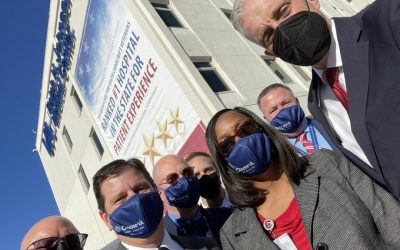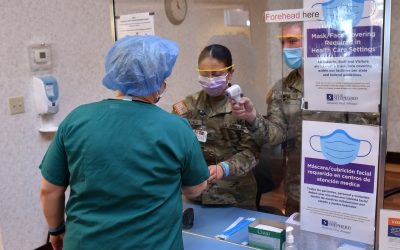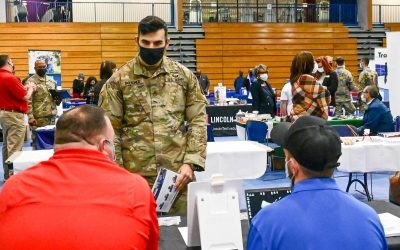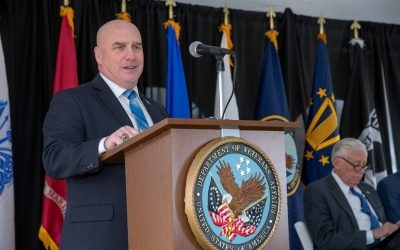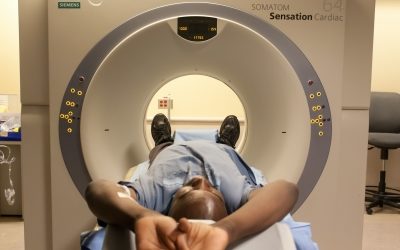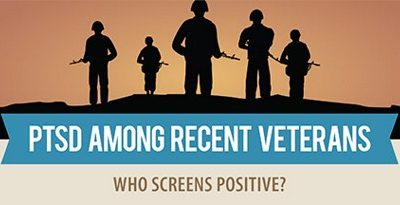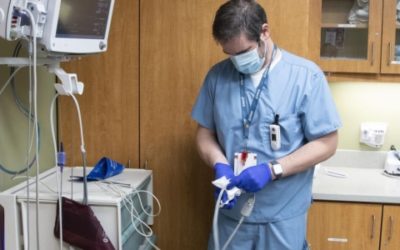More than a quarter of patients with acute kidney injury died within a year of hospitalization at the VHA, according to a 10-year study that ended in late 2017.
Why Do Cataract, TKA Surgeries Often Cost More at VA vs. Outside Care?
New study raises questions about which veterans requiring cataract and total knee replacement surgeries received community care, as opposed to the cases kept within the VA system.
Congressional Leadership Asks VA to Rethink Supply Chain System Plans
Bipartisan congressional leadership is asking that the VA halt its plans to adopt the Defense Logistics Agency’s (DLA’s) supply chain management system.
VA Announces Ambitious Plan to Improve Staff Recruitment, Retention
VA recently unveiled a 10-step human infrastructure plan designed to strengthen the department’s ability to recruit and retain staff.
Brain Stimulation Improves Memory in Veterans with Early Alzheimer’s Disease
Transcranial magnetic stimulation, or TMS, is a technique that uses strong magnetic pulses to stimulate regions of the brain, producing electric currents that may affect neuron activity.
Senate Passes Scaled-Down Bill Providing Healthcare to Burn Pit Victims
Legislation to extend healthcare to millions of veterans suffering from the effects of toxic exposure to burn pits passed the U.S. Senate unanimously last month. Advocates caution, however, that much more still needs to be done.
Prolonged Exposure Therapy Showed Some Advantages in Treating PTSD
Post-traumatic stress disorder is a prevalent and serious mental health problem among veterans. Of the veterans who received VA healthcare in 2019, 12.1% had PTSD, including 26.5% of veterans who served in Iraq or Afghanistan.
Why Does Sex Make a Difference in Statin Use Among Older Veterans?
Cardiovascular disease is the No. 1 cause of death for women in the United States, and female veterans are at particular risk.
VA Researchers Track COVID-19 Pandemic’s Impact on Healthcare Workers
As the COVID-19 pandemic exploded and Rebecca Hendrickson, MD, PhD, began hearing reports from friends and colleagues who were in the middle of the first waves in New York and Italy, she found their stories all too familiar.
‘Pan-Coronavirus’ Vaccine Developed by Army Research Shows Promise
Based on recent preclinical study results, the Spike Ferritin Nanoparticle (SpFN) COVID-19 vaccine is showing significant promise.
National Guard Pandemic Response Proves Motto ‘Always Ready, Always There’
For more than two years, the National Guard has risen to the challenges posed by COVID-19 as the pandemic has disrupted lives, supply chains, health care, education and more.
Transition to Civilian Life Remains Difficult Years After Military Discharge
Each year, more than 200,000 servicemembers leave the U.S. military—a transition that can prove difficult.
Palo Alto VA Tests Feasibility of Liquid Biopsy as Lung Cancer Screening Tool
The VA Palo Alto Health Care System stepped up to be the first testing site for an early detection study in lung cancer that uses a blood assay as a screening mechanism.
Wounding Therapies Show Promise in Skin Cancer Prevention
The most common form of cancer, nonmelanoma skin cancer (NMSC) — composed primarily of basal cell carcinoma and squamous cell carcinoma — affects about 3.3 million people annually.
Which Military Personnel Are Most at Risk of Skin Cancer? Study Has Answers.
Since the 1990s, both melanoma and nonmelanoma skin cancer have become more prevalent in the United States. Across the nation, more than 9,500 people are diagnosed with skin cancer every day.
VA Studies Continue to Demonstrate High COVID-19 Vaccine Effectiveness
From the time the COVID-19 mRNA vaccines became available in late 2020, VA studies have been crucial to understanding their effectiveness in real life.
How the DCVAMC Has Weathered Years of the COVID-19 Pandemic
The latter half of December and the first weeks of the new year were trying times for hospitals as the Omicron variant began sweeping across the country, causing infection rates and hospitalizations to rise to levels unprecedented even during the earliest months of the pandemic.
VA Study: Alarming Rise in CVD Complications After Initial COVID-19 Recovery
When it comes to cardiovascular complications, the acute care of COVID-19 symptoms in veterans appears to be only the first stage for what, in some cases, turns out to be a longer-term healthcare crisis.
Paradoxical Bronchospasm Might Go Unrecognized at VHA Facilities
It is rare, but inhaled short-acting β2-adrenergic agonists can elicit paradoxical bronchospasm (PB), which may be fatal. A new study raised concerns that the condition might be unrecognized at the VHA.
What Affects COPD Patients’ Response to Home Pollution
How COPD patients respond to particulate pollution based on personal characteristics and systemic responses is not well characterized. That’s why a new study sought to find out.
Factors Affecting Which COPD Patients Complete Pulmonary Rehab
Which veterans with chronic obstructive pulmonary disease are likely to participate in and complete a pulmonary rehabilitation program?
Military, Veterans More Likely to Be Screened for Many Types of Cancer
While some cancer diagnoses are disproportionately high among VA patients, the cause does not appear to be inadequate screening, according to a new study.
Hardin’s Mission Is Keeping Veterans Out of Criminal Justice System
Any interaction with the criminal justice system can be a frightening, confusing experience for those being charged. It can be especially difficult to navigate for men and women who are homeless or struggling with mental health or substance abuse issues.
Show me a successful individual and I’ll show you someone who had real positive influences in his or her life
My wife, Pam, and I have been truly blessed. We have raised three professional young adult women who are out in the world, blazing their own paths. We are preparing later this year to retire entirely and move toward a 30-year dream of living and traveling on a cruising catamaran full-time (more on this in coming editorials, dear reader). Pam and I have always followed the adage, “pay yourself first every month.”
VA Studies Continue to Demonstrate High COVID-19 Vaccine Effectiveness
From the time the COVID-19 mRNA vaccines became available in late 2020, VA studies have been crucial to understanding their effectiveness in real life.
Expanded Role for MTFs Could Improve Obstetric Care in Underserved U.S. Areas
If military treatment facilities offered emergency cesarean delivery and other high-quality obstetric care to civilians in underserved areas of the United States, according to a new study, it would not only significantly improve the health of expectant mothers and their babies but also potentially improve military readiness.
Repeat Lung-Cancer Screening Lags for Rural Veterans
Repeat lung cancer screening lags among rural veterans and could help explain known disparities in outcomes, according to a new study.
Military, Veterans More Likely to Get Most Cancer Screening
While cancer diagnoses are disproportionately high among VA patients, the cause does not appear to be inadequate screening, according to a new study.
What Are Associations Among Panic Attacks, PTSD and SUDs in Veterans?
Posttraumatic stress disorder (PTSD) has been estimated to affect 12.9% of U.S. veterans, compared to the lifetime risk of PTSD in the general population which is estimated at 6.8%.
Ann Arbor VAMC Rapidly Stands Up Monoclonal Antibody Treatment Service
As emergency departments around the country struggled to get through the day during the recurrent surges of the COVID-19 pandemic, the emergency medicine team at the LTC Charles S. Kettles VAMC here did something extraordinary—they sought out more patients to treat.

